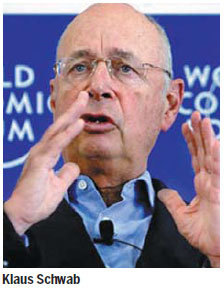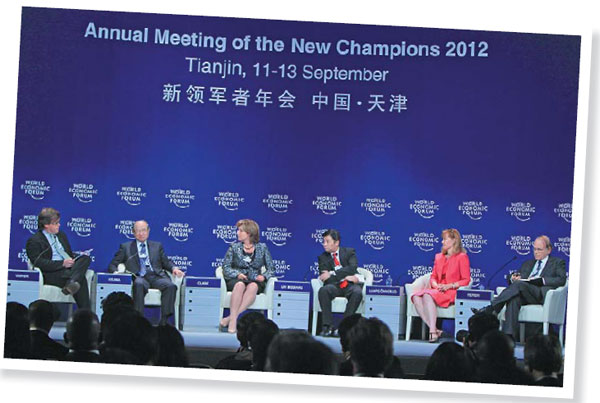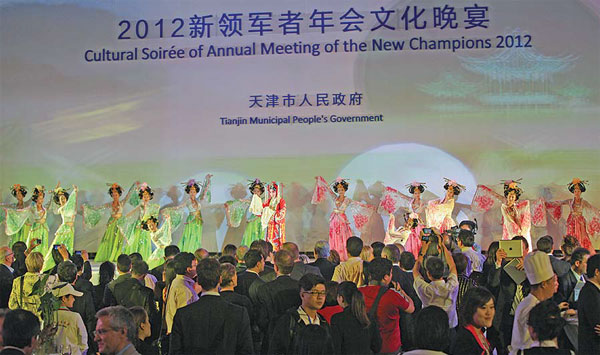"Previously when people met me at the airport, they would say, 'Professor, I've met you at Davos' - but now they say, 'I've met you in Tianjin'."
That's how founder and executive chairman of the World Economic Forum Klaus Schwab opened a discussion with the Tianjin delegation in his office last September.
"The design of the Tianjin Culture Center is very distinctive," he told them. "The library, theater and museum there are amazing."
Despite his well-known identity as the top man at the WEF, Schwab still prefers people call him "professor".
Born in Ravensburg, Germany in 1938, Schwab enrolled to ETH Zurich in 1957. It is considered the best university in Switzerland, a place where Albert Einstein also studied.
At the time, Schwab was a studious young man. He received doctoral degrees in engineering and economics.
To broaden his vision, he went to study at Harvard University and received master's degree in public administration from the Kennedy School of Government a year later.

After nearly 10 years of study at universities, Schwab eventually became a part-time business professor at the University of Geneva.
He was full of passion and was never content with the status quo. He always had an idea to build a platform for business and political leaders in the Europe to exchange their thoughts.
In 1970, Schwab began to work on turning the idea into reality. In the following year, the European Management Symposium was held successfully in Davos, a ski resort in the Swiss Alps. Four hundred and fifty participants from 31 countries, 50 teachers and reporters attended the event.
Schwab was encouraged by the first success and established the European Management Forum.
From 1972 to 2003, Schwab was a full-time professor at the University of Geneva. In addition to teaching, he worked on developing the forum, which changed its name to the World Economic Forum in 1987.
The relationship between the forum and China can be traced back more than 35 years.
In 1978, China started its reform and opening-up. Recognizing the significance of the change, Schwab send an invitation to later leader Deng Xiaoping.
In 1979, China sent a delegation to the forum. It was the first Chinese delegation to Davos and marked the beginning of contact and cooperation between China and the forum.
In April 1979, Schwab visited China for the first time.
But it would take until 2006 for the WEF to open an office in Beijing, its first office outside Switzerland.
In the summer of 2007, the World Economic Forum began to hold meetings in Dalian, a coastal city in Northeast China, in addition to its annual meetings in Davos in winter.
The next year the summer meeting was held in Tianjin. The two cities have since taken turns hosting the annual Summer Davos Forum, which has increased influence over the years.
Every year, the host city of Dalian or Tianjin organizes an evening party before the Summer Davos to showcase Chinese culture and cuisine. The parties have attracted many visitors - and Professor Schwab was present every time.
In January, the municipal government of Tianjin held a themed activity called Night of Tianjin in the same venue that hosts Summer Davos. About 700 participants, including foreign political leaders, heads of international organizations, delegations from Fortune 500 enterprises and famed scholars, joined the gala that displayed the local culture.
Schwab said such pleasant cooperation with Tianjin makes him look forward to the upcoming eighth Summer Davos Forum and believes it will bring many surprises as eight is a lucky number in Chinese culture.
The year 2014 is crucial as it will see the global economy rebound for a full recovery, Schwab said.
hantianyang@chinadaily.com.cn

